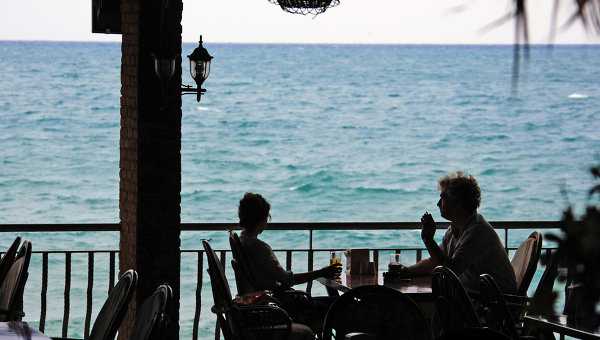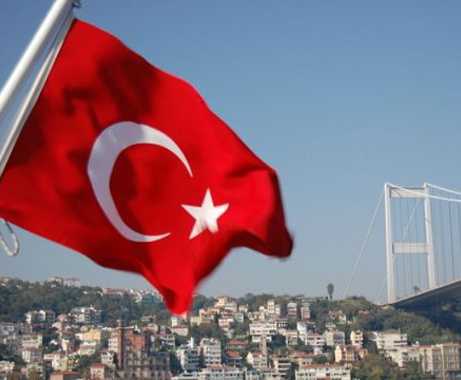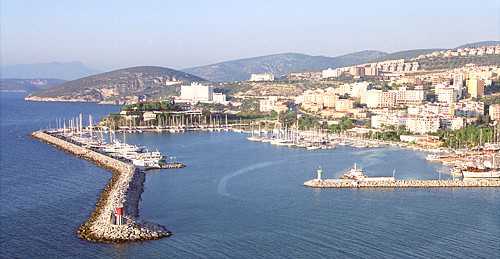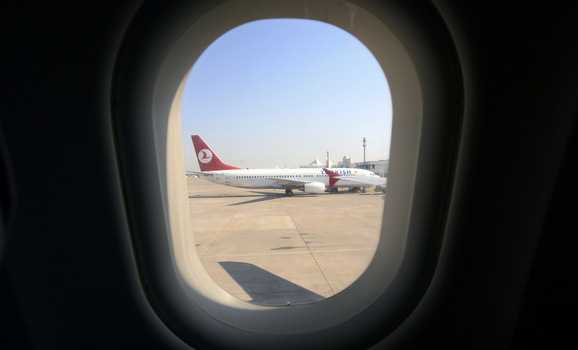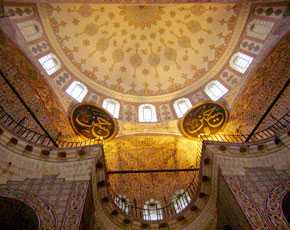Turkish Secularism Is Democratic
by E. Haldun Solmazturk
Middle East Quarterly
Summer 2008, pp. 67-70
Policymakers and future historians may get whiplash from divergent analyses of where Turkey is headed. Some Turkish writers—The Turkish Daily News’ Mustafa Akyol and Zaman’s Ali Aslan, for example — argue that Prime Minister Recep Tayyip Erdoğan and his Justice and Development Party (Adalet ve Kalkınma Partisi, AKP) have succeeded at melding Islam to modern democracy. Other writers — The Turkish Daily News’ Yusuf Kanlı or the Washington Institute’s Soner Cagaptay — are far more suspicious.
—The Editors
At the heart of the political debate in Turkey lies the tension between Islam and secularism. Is the former democratic and the latter, at least in Turkey, autocratic? Ömer Taşpinar, a non-resident fellow at the Brookings Institute, recently argued this case in Foreign Affairs (“The Old Turks’ Revolt,” November/December 2007). His thesis is trendy in certain circles, but it is dishonest. He bases his argument on false assumptions, cherry-picks data, and ignores context. What results is not so much scholarship as propaganda.
Taşpinar paints Turkish prime minister Recep Tayyip Erdoğan as a progressive, committed democrat, and enthusiastic about embracing Europe. The reality is more ambivalent. On September 2, 2004, for example, Erdoğan proposed making adultery a crime.[1] When the European Union criticized this move, Erdoğan told them “to mind their own business,”[2] for they were not qualified to opine on such issues. On November 15, 2005, after the European Court of Human Rights decided against permitting head scarves in Turkish universities, he declared that “only ulama [Islamic religious scholars] could”[3] make this decision. These episodes dismissing European consensus and institutions are well-known in Turkey and were featured on the front pages of major newspapers. Turkish commentators and editorialists discussed whether the prime minister’s statements suggested that religious law guided Erdoğan as much if not more than secular law.
Taşpinar’s treatment of the 2007 presidential election row is also questionable. Ahead of the elections, tensions increased, and on April 27, 2007, the Turkish General Staff placed a statement on its website declaring that the “problem that emerged in the presidential election process was focused on arguments over secularism. The Turkish armed forces have been concerned about the recent situation … [and are] an absolute defender of secularism … [and] maintain their sound determination to carry out their duties stemming from laws to protect the inalterable characteristics of the Republic of Turkey.”[4] Taşpinar condemns this “e-coup” as undemocratic military intervention, an argument he advances by stripping events of their context.
The Turkish General Staff statement should properly be viewed against the backdrop of Erdoğan’s attacks on both the High Court (Danıştay)[5] and Higher Education Council (Yüksek Öğretim Kurulu).[6] Following the prime minister’s verbal fusillades, an armed man attacked the court to “punish the enemies of Islam,”[7] killing a judge. Then, two days before the Turkish General Staff’s Internet statement, an assailant attempted to assassinate the chairman of the Higher Education Council.[8] The Turkish General Staff was affirming the Constitutional Court’s right to judge freely absent AKP political intimidation. Taşpinar’s suggestion that the General Staff’s statement affirming its commitment to the Turkish constitution is somehow unconstitutional is Orwellian.
Other problems permeate Taşpinar’s analysis. Last year’s presidential elections were delayed by four months because of a constitutional challenge. For academics, omission is a sin second only to plagiarism, but this is what Taşpinar does. Unsure of what his party’s standing would be after scheduled parliamentary elections, Erdoğan sought to select the new president with the lame-duck parliament rather than go to the polls. Taşpinar belittles secularist concerns about the nomination of Abdullah Gül, the AKP’s pick as president. But Gül’s nomination was unlike any previous presidential choice: By tradition, the parliament selects for the presidency a consensus figure approved by all major political party leaders. The president, in other words, is supposed to be above party politics. But rather than seek such a consensus figure, Erdoğan used his party’s majority to impose a candidate, declaring Gül his party’s choice a day before the deadline, effectively eliminating discussion. Following the July 22 general elections which ensured an AKP majority in parliament, he again imposed the same appointee despite promises to seek a consensus figure.[9] How Taşpinar can construe this as “significantly improving the democratic record” is not clear.
Taşpinar may not have much regard for dissent, but Turkish parliamentarians embrace it as their democratic right. Unease with Erdoğan’s actions led many parliamentarians to deny Erdoğan and Gül a quorum, an action deemed legal by the Constitutional Court. To suggest that dissent according to constitutional procedures is undemocratic is tendentious. Indeed, Erdoğan’s statement that compromise is “to accept what the majority decides”[10] suggests that it is the AKP rather than the liberals and mainstream secular parties that lack a culture supportive of democratic ideals and practices.
Taşpinar is also dishonest in his description of the Turkish presidency. He says the “post of the president” is “largely ceremonial.” But the president has many important functions. For example, according to Article 104 of the Turkish Constitution of 1982, the president returns laws to the Turkish Grand National Assembly for reconsideration should he believe them unconstitutional; submits to referendum, if he deems it necessary, legislation regarding amendment of the constitution; appeals to the Constitutional Court for the annulment of either part or the entirety of certain provisions of laws, decrees, and Rules of Procedure of the Turkish Grand National Assembly on the grounds that they are unconstitutional; calls new elections for the Turkish Grand National Assembly; represents the Supreme Military Command of the Turkish Armed Forces on behalf of the Turkish Grand National Assembly; decides on the mobilization of the Turkish armed forces; appoints the chief of the General Staff; calls meetings of the National Security Council; proclaims martial law or states of emergency; appoints the members and the chairman of the state Supervisory Council; appoints the members of the Higher Education Council; appoints rectors of universities; appoints the members of the Constitutional Court, the chief public prosecutor and the deputy chief public prosecutor of the High Court of Appeals, the members of the Military High Court of Appeals, the members of the Supreme Military Administrative Court, and the members of the Supreme Council of Judges and Public Prosecutors. The presidency is one of the most essential pillars of the political balance of power formulated in the Turkish constitution.
Taşpinar is also prone to exaggeration. Turkey did not, as he suggests, “come to the brink of a military coup.” Amid a constitutional crisis brought on by a heated presidential election, Turkey went to the courts, just as the United States did seven years before. If anything, the resolution of the crisis through submission to established institutions confirmed Turkey’s maturity. A few analysts talked of a military coup to grab headlines, but for the most part, such talk was a red herring advanced by Islamists and their fellow-travelers to stifle criticism of the AKP. Erdoğan’s supporters branded anyone who questioned his policies as coup supporters or fascists.
Such dishonesty is the rule rather than the exception in “The Old Turks’ Revolt.” While Taşpinar is right to consider that the veil has become central to discussions over Islamism and secularism in Turkey, his assertion that women were ever “prohibited from wearing the Islamic veil in public” is false. Perhaps for partisan reasons, Taşpinar further misconstrues the Turkish debate. Not all veils are the same. The traditional Turkish head scarf is quite different than the Saudi-style head covering that Erdoğan and Gül’s wives favor.
And while it is true that the prospect of a veiled first lady was a source of controversy before the election, the debate over Gül’s wife, Hayrunnisa, went deeper.[11] In 2002, she sued Turkey before the European Court of Human Rights over the head scarf, but based on an unfavorable decision upholding the ban and establishing a clear precedent, she had to withdraw her complaint in 2004.[12] If the wife of a major U.S. presidential candidate sued her country in an international court in order to make an end run around the democratic process, many Americans would object to her ascendancy. Turks are no different. As to why Taşpinar ignores this episode, only he can say.
Taşpinar is also incorrect to label Kemalism, the governing philosophy introduced by Mustafa Kemal Atatürk, as “radical secularism.” Separation of religion and governance is not radical, nor is Turkey anti-religion. What the Kemalists have done, and, perhaps, what Taşpinar dislikes, is forbid the use of religion for political ends. That Turkey’s constitution relegates the practice of religion to the private sphere is no more radical than the U.S. Constitution’s separation of church and state. Taşpinar is dishonest to suggest that Kemalists entertained the eradication of Islam. This is as absurd as saying that the U.S. founding fathers sought the demise of Christianity.
Erdoğan has presided over a remarkable transformation of Turkish society. Fifty-one percent of Turkish Muslims surveyed in 2006 think of themselves as Muslim first and Turkish second. A year earlier, only 43 percent thought of themselves as Muslim before Turkish.[13] Such figures are not consistent with Taşpinar’s statement that Turkey has become a more “democratic and Western-oriented Turkey under AKP leadership.”
The AKP’s record is not all bad. Under Erdoğan’s stewardship, average per capita income doubled. Taşpinar falls short, though, in dismissing the legitimacy of secular and liberal parties’ criticism of the AKP’s economic management. Under the AKP, debt also doubled. As the dollar weakens and Ankara struggles to meet its debt payments, Turkish citizens realize that many of the gains that the AKP claims are ephemeral. In addition, they recognize that corruption has again become a major problem. For example, finance minister Kemal Unakıtan has become famous for his ability to put together arrangements ranging from the sale of real estate to special-case import tax regulations that profit his family; the AKP has used its parliamentary majority to stymie calls for investigations.[14] Corruption has long been a problem in Turkish politics and in Turkish society at large, but Erdoğan’s bullying and the AKP’s secrecy has made Turkey’s economy more opaque rather than more transparent—hardly an indicator of commitment to democracy.
Given Erdoğan’s intolerance of the independent media and judiciary as well as those university rectors, industrialists, and ordinary citizens who do not subscribe to his party’s precepts, in addition to his efforts to purge party members who voice independent positions, it is difficult to understand how Taşpinar can describe the AKP as “embracing democratic and liberal positions.” Democracies are not ruled by sultans. And scholarship is not advanced by falsehood.
E. Haldun Solmazturk is a retired Brigadier General in the Turkish Army.
[1] Hürriyet (Istanbul), Sept. 2, 2004.
[2] Sabah (Istanbul), Sept. 17, 2004.
[3] Radikal (Istanbul), Nov. 16, 2005.
[4] Turkish General Staff statement, no. BA-08/07, Apr. 27, 2007.
[5] Zaman (Istanbul), Feb. 11, 2006.
[6] CNN Türk, Feb. 21, 2007.
[7] NTV-MSNBC, May 19, 2006.
[8] Haberler (Istanbul), Apr. 25, 2007.
[9] Hürriyet, July 24, 2007.
[10] NTV MSNBC, July 12, 2007.
[11] Tulin Daloglu, “Covering Customs in Turkey,” The Washington Times, Nov. 27, 2007.
[12] “Grand Chamber Judgment: Leyla Şahin v. Turkey,” The European Court of Human Rights, press release, Nov. 10, 2005.
[13] “Turkey and Its (Many) Discontents,” Pew Forum on Religion and Public Life and Pew Global Attitudes Project, Washington, D.C., Oct. 25, 2007.
[14] Guler Komurcu, “Peki Unakıtan’ı kim taşıyor?” Akşam (Istanbul), Feb. 28, 2006.

